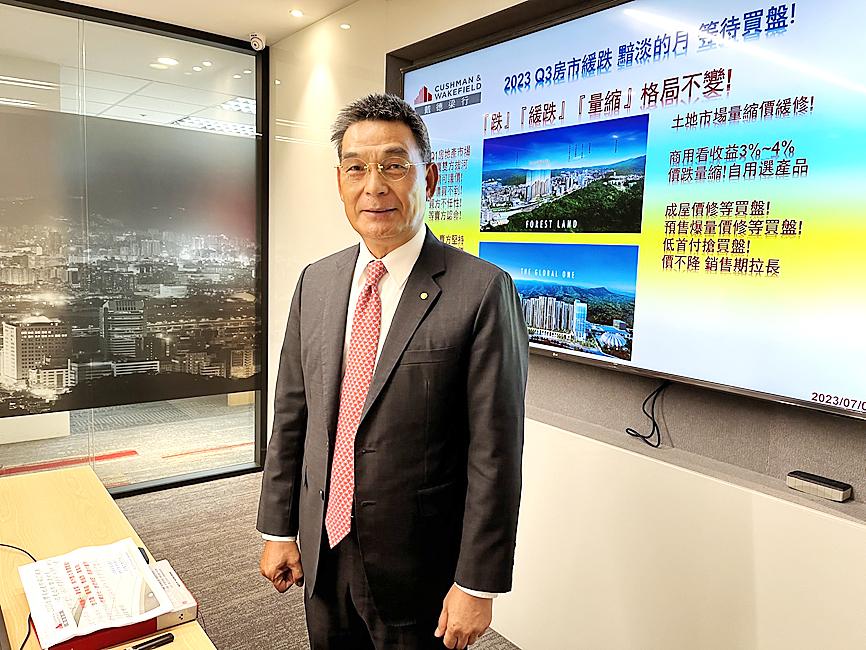Commercial property transactions last quarter surged 88.9 percent year-on-year to NT$52.2 billion (US$1.68 billion), uplifted by the liquidation sales of buildings owned by a real-estate investment trust (REIT) fund, global commercial property broker Cushman & Wakefield Taiwan said yesterday.
The Shin Kong No. 1 REIT (新光一號) fund sold its six buildings in Taipei for NT$30.7 billion that accounted for 60 percent of the trading volume during the April-to-June quarter, the company said.
All six buildings generate regular rent incomes and therefore attracted institutional investment buyers, Cushman & Wakefield Taiwan said, adding that the market would put up a lackluster performance in the absence of the REIT deals.

Photo: Hsu Yi-ping, Taipei Times
The buildings saw their value grow threefold from NT$11.3 billion upon the fund’s launch in 2005, therefore encourage domestic REIT funds, which are not as popular as peers elsewhere, analysts said.
It is not clear at this juncture how much the beneficiaries would receive following the liquidation.
Industrial properties intended for self-occupancy made up the bulk of commercial property sales, Cushman & Wakefield said.
In the first half of this year, commercial property transactions held virtually steady from a year earlier.
At the same time, land deals amounted to NT$20 billion, higher than NT$16.3 billion in the preceding quarter, but the first-half sum of NT$36.3 billion marked the lowest since 2016, when the government introduced combined property tax to cool the market, the consultancy said.
The muted showing reflected conservative approach on the part of developers and builders in response to interest rate hikes, credit controls and unfavorable measures to ban presale house contract transfers, it said.
Developers and builders have some land stock on hand and would rather stay on the sidelines until the nation’s economic and political uncertainty settles, said Billy Yen (顏炳立), managing director at Cushman & Wakefield Taiwan.
Looking forward, the market is likely to see further transaction declines with stable prices, Yen said, adding that downside risks loom larger than upside surprises in the foreseeable future.
Taiwan is to elect new legislators and a president, and candidates tend to pledge measures to make house prices more affordable, he said.
Housing transactions this year would fall 240,000 to 250,000, suggesting little improvement in the second half, Yen said.
Still, developers and builders display keen interest in urban renewal and MRT joint development projects, as they do not require land plots and are not subjected to credit controls, Cushman & Wakefield Taiwan said.

In Italy’s storied gold-making hubs, jewelers are reworking their designs to trim gold content as they race to blunt the effect of record prices and appeal to shoppers watching their budgets. Gold prices hit a record high on Thursday, surging near US$5,600 an ounce, more than double a year ago as geopolitical concerns and jitters over trade pushed investors toward the safe-haven asset. The rally is putting undue pressure on small artisans as they face mounting demands from customers, including international brands, to produce cheaper items, from signature pieces to wedding rings, according to interviews with four independent jewelers in Italy’s main

Japanese Prime Minister Sanae Takaichi has talked up the benefits of a weaker yen in a campaign speech, adopting a tone at odds with her finance ministry, which has refused to rule out any options to counter excessive foreign exchange volatility. Takaichi later softened her stance, saying she did not have a preference for the yen’s direction. “People say the weak yen is bad right now, but for export industries, it’s a major opportunity,” Takaichi said on Saturday at a rally for Liberal Democratic Party candidate Daishiro Yamagiwa in Kanagawa Prefecture ahead of a snap election on Sunday. “Whether it’s selling food or

CONCERNS: Tech companies investing in AI businesses that purchase their products have raised questions among investors that they are artificially propping up demand Nvidia Corp chief executive officer Jensen Huang (黃仁勳) on Saturday said that the company would be participating in OpenAI’s latest funding round, describing it as potentially “the largest investment we’ve ever made.” “We will invest a great deal of money,” Huang told reporters while visiting Taipei. “I believe in OpenAI. The work that they do is incredible. They’re one of the most consequential companies of our time.” Huang did not say exactly how much Nvidia might contribute, but described the investment as “huge.” “Let Sam announce how much he’s going to raise — it’s for him to decide,” Huang said, referring to OpenAI

The global server market is expected to grow 12.8 percent annually this year, with artificial intelligence (AI) servers projected to account for 16.5 percent, driven by continued investment in AI infrastructure by major cloud service providers (CSPs), market researcher TrendForce Corp (集邦科技) said yesterday. Global AI server shipments this year are expected to increase 28 percent year-on-year to more than 2.7 million units, driven by sustained demand from CSPs and government sovereign cloud projects, TrendForce analyst Frank Kung (龔明德) told the Taipei Times. Demand for GPU-based AI servers, including Nvidia Corp’s GB and Vera Rubin rack systems, is expected to remain high,